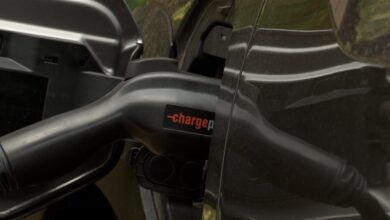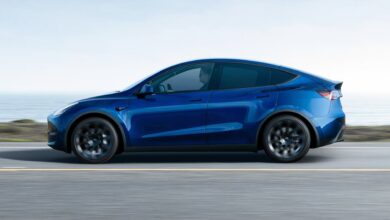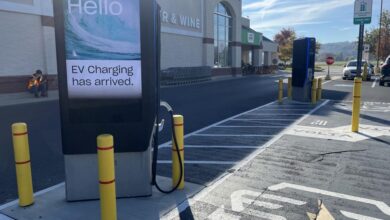Vermont to expand EV fast chargers this year
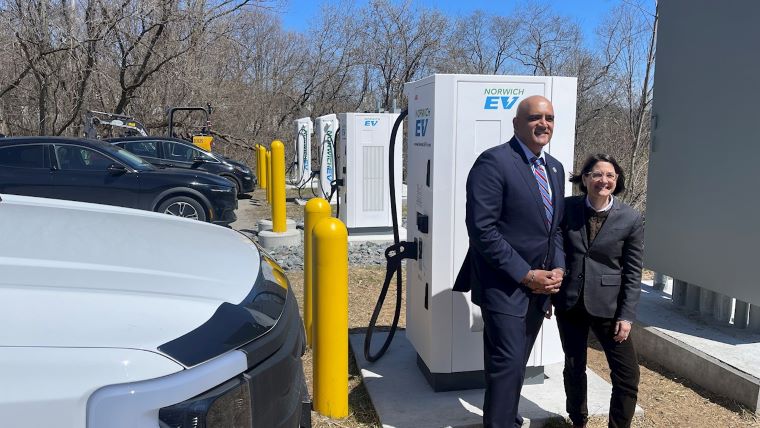
Transportation Secretary Joe Flynn with Congresswoman Becca Balint at the NEVI event April 23 in Bradford. Courtesy photo.
by Timothy McQuiston, Vermont Business Magazine Drivers of fully electric vehicles in Vermont are beginning to feel some relief from range anxiety with the arrival of the first fast chargers provided through the National Electric Vehicle Infrastructure (NEVI) program. The four super-fast NEVI charging stations can simultaneously charge 180 kilowatts per hour and are located in a municipal parking lot known as Denny Park at 6 South Main Street in downtown Bradford, near I-91. Many more locations are on the way and the Vermont Agency of Transportation is taking applications for the future sites. There will be a total of 15 NEVI sites, which will be located near key interchanges and local routes across Vermont
(See EV charging site maps below).
Those four super-fast (Level 3 DC) NEVI charging stations announced April 23 can simultaneously charge 180 kilowatts per hour and are located in a municipal parking lot known as Denny Park at 6 South Main Street in downtown Bradford, near I-91. They can charge an EV in about 15 minutes.
Transportation Secretary Joe Flynn told VermontBiz that the next 14 NEVI sites will be under contract this year, though the completion of all those buildouts might not be completed this year necessarily. He added that because of federal funding regulations, they will not be located at the interstate rest stops.
The new fast chargers in Bradford complement two existing 50-kilowatt DC fast chargers and a single AC Level 2 charger installed at the site by Norwich Technologies under a grant agreement with the Vermont Department of Housing and Community Development.
Through an interagency memorandum of agreement and a sole source contract with AOT, Norwich Technologies modified design plans for the site to meet NEVI’s rigorous specifications and will manage operations and maintenance for at least the next five years to ensure the chargers are functional and reliable for EV drivers. Along with Norwich Technologies, Vermont AOT has been working with Green Mountain Power on the EV charger buildout.
“Interagency coordination has been a distinct feature of Vermont’s progress in the transition to clean transportation to date, and the Bradford project is another great example of this,” Secretary Flynn said at the Bradford ribbon cutting. “This is just the beginning. Bradford is the first of 15 locations in this phase of NEVI funding that we’re working to have under contract by the end of the year.”
For federal fiscal years 2022-2026, Vermont will receive $21.2 million, with the Federal Highway Administration already apportioning $3.1 million for FY2022 and $4.5 million for FY2023. The funding comes with a federal share of 80% and match requirement of 20%, which can be met with the private investment of third-party contractors.
The first phase focuses on installing fast chargers every 50 miles along the nation’s highway corridors, within one mile of highway exits. NEVI was established through the 2021 Infrastructure Investment and Jobs Act, often referred to as the Bipartisan Infrastructure Law. The goal of the program is to create a convenient national network of fast EV charging stations to support the use of more electric vehicles and increase equitable access to infrastructure and economic opportunity.
The Bradford site features four ABB E-mobility Terra 184 chargers, which are Build America, Buy America (BABA) compliant, and meet the NEVI technical standards, allowing drivers to charge quickly and get back on the road.
“We chose ABB E-mobility for their robust and reliable chargers that readily meet the extensive compliance standards for state and federal NEVI projects,” said Troy McBride, Chief Technology Officer of Norwich EV. “Complex public fast charging projects require a technology provider you can depend on, ABB E-mobility’s experience and professional service enabled us to open our first NEVI site smoothly.”
ABB E-mobility has been designing and manufacturing EV chargers for nearly 15 years and electrification equipment for over a century.
The NEVI program provides federal funding for the deployment of charging stations with the balance (a minimum match requirement of 20%) to be met with private dollars by third-party contractors engaged through the State’s procurement process. Private contractors are encouraged to avail themselves of the Alternative Fuel Vehicle Refueling Property Credit, a recently reauthorized federal tax credit for EV charging, to help stretch Vermont’s share of federal dollars further.
Through May 22, AOT is accepting statements of qualifications from interested parties to develop a short list of vendors qualified to design, build, own, operate, and maintain NEVI-compliant charging. Vendors selected through the Request for Qualifications (RFQ) will be invited to bid on the remaining 14 priority sites.
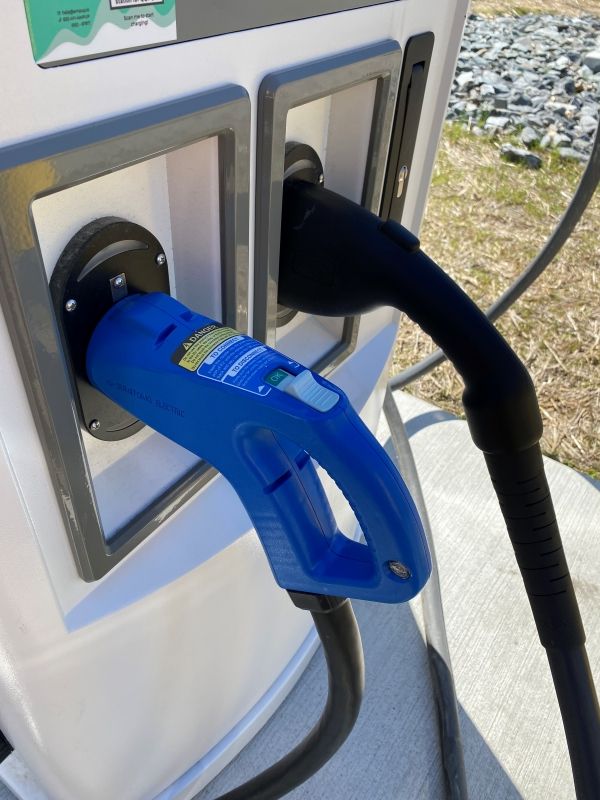
For additional information about Vermont’s NEVI plan and the RFQ opportunity, visit the AOT website.
In addition, while not immediately germane to Vermont, The Boston Globe reported that on April 29, Tesla chief executive Elon Musk abruptly laid off Rebecca Tinucci, head of the company’s charger station effort, and her entire 500-person unit, according to a report in The Information.
On April 30 Tesla CEO Elon Musk wrote on X (formerly Twitter) that, “Tesla still plans to grow the Supercharger network, just at a slower pace for new locations and more focus on 100% uptime and expansion of existing locations.”
There was an effort to integrate the vast Tesla Supercharger network into a standard fast-charging, national network. The Globe story said Vermont’s Transportation Agency does “not have any insight at this time into how Tesla’s recent announcement may impact EV charging buildout in Vermont,” VTrans said in an email.
The Globe reported that Massachusetts has 838 fast charging ports at stations for electric vehicles but needs to build about 9,000 more ports by 2030 to handle the expected growth in EVs required under the state’s climate goals. Massachusetts will get about $60 million to build chargers under the National Electric Vehicle Infrastructure (NEVI) program created by the infrastructure law, The Globe reported.
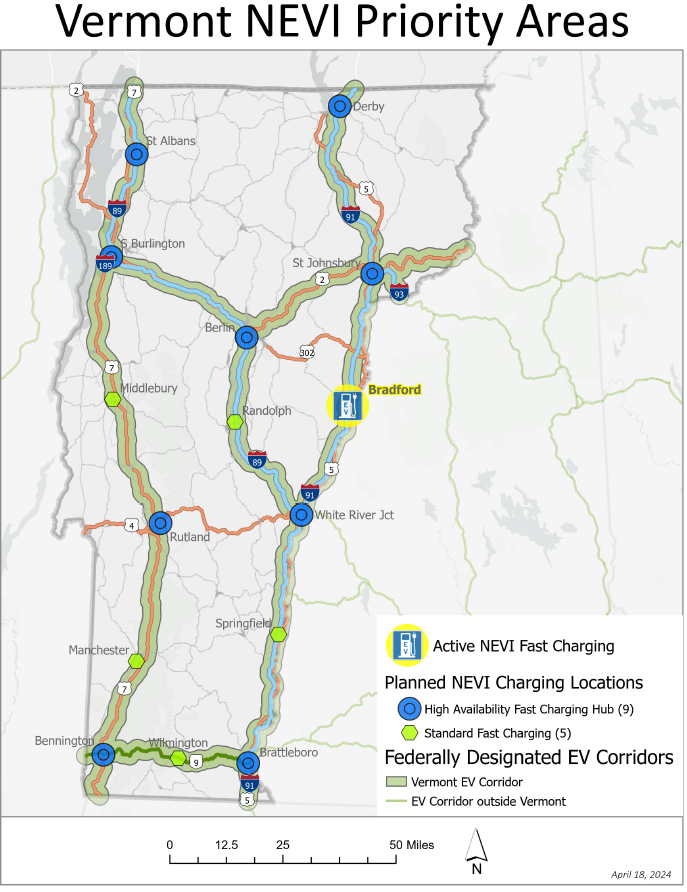
The first map – shows 10 (4 more to be determined) “areas” being targeted. The exact location in each area has yet to be chosen.
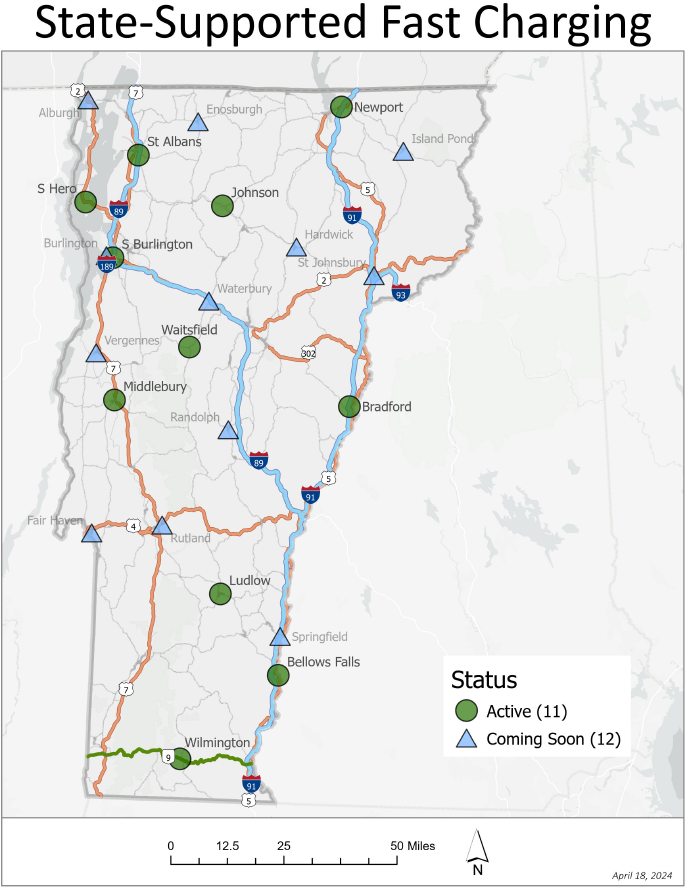
The second map – current state-supported Fast Charging sites (but not 180 kilowatts/hr. like the NEVI sites)
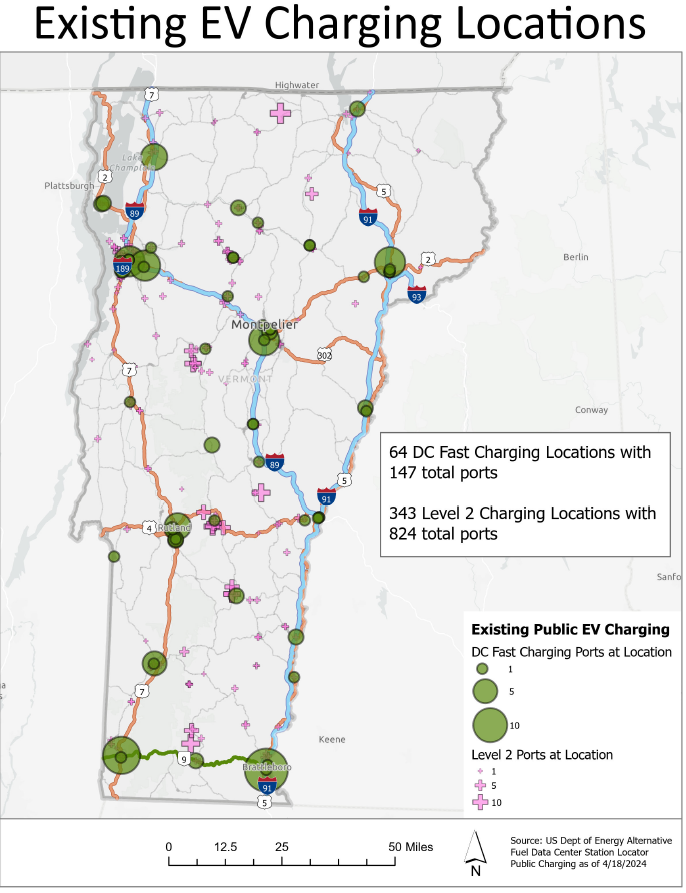
The third map – shows all existing EV charging sites, of all charging levels, in VT thus far.


